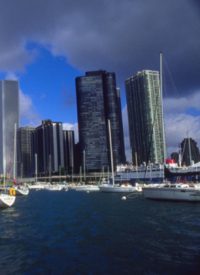
When it was learned that more than 50 people were shot, some fatally, over Fathers Day weekend in the poorer sections of Chicago, it didn’t even make the front page of Chicago newspapers.
As ABC News put it, “Most of the weekend shootings took place in poor neighborhoods on the city’s south and west sides. Those areas are away from downtown and tourist attractions, perhaps one reason much of the city seemed to shrug its shoulders at the violence.” Jim O’Shea, editor of Chicago News Cooperative, said, “I think people just say, ‘Ah, it’s a bunch of gang bangers shooting each other.’"
Police and other officials put the blame on gangs and easy access to guns despite one of the strictest bans on handguns in the country. It is that very ban that is being challenged in a Supreme Court case, McDonald v. City of Chicago, with a decision to be announced very soon.
Alan Gottlieb, executive vice president of the Second Amendment Foundation, one of the plaintiffs in the case, was quick to make the point that “Chicago has become a slaughterhouse where defenseless victims are terrorized by armed thugs who have taken full advantage of an unarmed populace. [Chicago Mayor] Daley and his predecessors who perpetuated this ban are wading knee-deep in the blood of hundreds of crime victims who should have had the means to defend themselves…. Within days we should have a ruling from the Supreme Court that puts an end to this insanity and gives the citizens of Chicago back their right to defend themselves…. We took Daly to court because we trust his citizens more than he does with their self-defense rights. Chicago residents have endured the terror of public disarmament for almost three decades, and all they have to show for it is a body count. Mayor Daley should be ashamed.” (Emphasis added.)
Responding to questions about the level of violence in Chicago, police say that violent crime in Chicago is down 11 percent so far this year, despite the weekend rampage. And Mayor Daley remains adamant that his gun controls work to reduce crime. Daley’s recent crude remarks to a reporter questioning the effectiveness of the city’s gun ban earned him few credibility points. After those remarks, Daley said, “To me, any gun taken off [the street] saves thousands of lives in America. I really believe that. I don’t care what you tell me.”
Even among his supporters, Daley’s noisy and rude remarks are causing some to question his effectiveness in his war against guns. Gregory Kane, writing for the San Francisco Examiner, suggested a memo: “Dear Mayor Daley. Please shut up. You ain’t helping us.” And then added: “The man is a walking billboard for right-to-carry laws…. For the sake of [the citizens], Chicagoans need to take this pathetic excuse for a mayor and retire him from office.”
If the Supreme Court rules against Chicago as many expect, will that decision actually put “an end to this insanity” as Gottlieb suggests? The Chicago Tribune explored the background of the lead plaintiff in the case, Otis McDonald. McDonald is a retired maintenance engineer living in the Morgan Park suburb of Chicago who just “wants a gun to protect himself from the hoodlums preying upon his neighborhood.” His home has been burglarized three times and just five years ago three teenagers surrounded his car and threatened to shoot him. Says McDonald, “I would like to have a handgun so I could keep it right by my bed just in case somebody might want to come in my house.” When asked if he thinks removing the present ban on handguns in the city would make any difference, he responded “[The criminals] get all the guns they want anyway.”
Robert VerBruggen wrote that he doubts the Supreme Court decision will have any impact on violent crime, one way or the other. His review of the recently updated book More Guns, Less Crime, by John Lott, holds that Lott’s “central argument about right-to-carry laws has failed to create any kind of consensus [that such laws reduce crime]…. If the Supremes do strike down the ban, Chicago and other cities that ban guns will have to decide whether to try to preserve their bans in lesser form, inviting further court challenges, or just give up and let their residents own guns.” He concludes:
Gun-rights supporters shouldn’t have to prove anything. They are on the side of freedom. Gun controllers, by contrast, want to restrict freedom, and thus [they] must prove that their policies provide benefits that are worth that freedom. Whether the topic is RTC [Right To Carry], handgun bans, buyback programs, assault-weapon restrictions, or registries, there is simply no evidence whatsoever indicating that to be the case. That’s one thing that Lott and the debate he inspired have proven — whatever the merits of the claim that gun control actually increases crime.
Attorney Edwin Vieira, writing for The New American, agrees that the battle is far from over. Even if the Supreme Court decides in favor of McDonald, “a great pitfall threatens [the case] … for the court could end up deciding that, although “the right of the people to keep and bear Arms” does apply to the States, it is merely a so-called ‘individual’ right … and therefore subject to whatever ‘regulations’ of State and local governments, judges and legislators may deem appropriate.”
Would that life would be so simple as to be able to put all concerns about freedom into a black-and-white format such as this pending Supreme Court case, and then wait for the court to tell its citizens what their rights are. Those rights, given by God and guaranteed under the Constitution and the Bill of Rights, started eroding almost from the beginning of the Republic, and they simply won’t be regained so quickly or easily.



